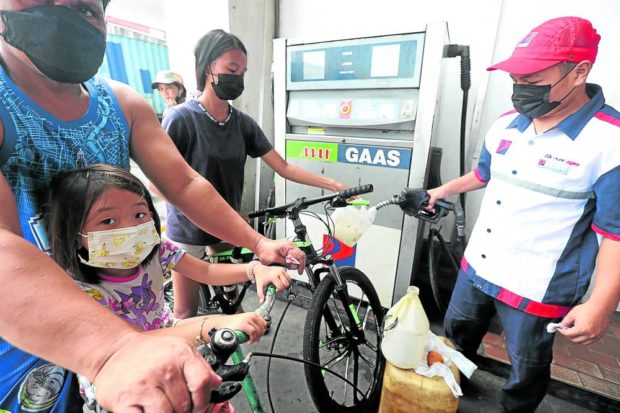
SUPPLY QUEUE | As in water, every drop of fuel counts amid soaring prices. (MARIANNE BERMUDEZ/INQUIRER FILE PHOTO)
MANILA, Philippines — After making a hefty rollback in fuel prices last week, oil companies are expected to raise them by as much as P8.30 per liter this week after Russian President Vladimir Putin threatened European gas imports and a storm knocked out a major oil pipeline.
Two-fifths of the gas Europeans burn and over a quarter of their imported crude comes from Russia.
The European Union’s Russian energy imports were worth $108 billion in 2021.
A storm last week damaged a pipeline of the Caspian Pipeline Consortium being used by Kazakhstan and Russia to export their oil from the Black Sea.
It’s one of the world’s biggest oil pipelines and is used to ship their crude to the global market.
Bigger Asian demand
On Saturday, Unioil, a major local oil company, said fuel prices in the country may increase next week by P8 to P8.30 per liter for diesel and by P2.90 to P3.10 for gasoline.
Last week, the price of one liter of diesel went down by P11.45 and gasoline by P5.45.The higher increase in diesel prices is due to the bigger demand for it in the Asian market compared to gasoline, resulting in tighter supply.
Aside from pricing, the deregulation of the regional market for diesel continues to push prices up, especially for finished petroleum products that are imported.
As of Saturday, the price of Asian benchmark Dubai crude continued to hover above $100 a barrel while the global benchmark Brent crude was $120 a barrel.
Following industry calculations, every dollar rise in oil prices would result in an increase of between P0.27 and P0.30 per liter, while with every fluctuation in the peso-dollar exchange, local pump prices may increase between P0.13 and P0.15 per liter.
Price hikes are usually implemented on Tuesdays.
Contracting program
Transport groups, still reeling from the fuel price increases, on Saturday asked the government to reconsider its planned Service Contracting Program, which would be getting a P7-billion funding from the budget of the Department of Transportation for its “Libreng Sakay” (free ride) program.
Instead of the free ride scheme, the Move As One (MAO) coalition recommended that the government allocate at least half of the amount to net service contracting to be accessed by smaller transport cooperatives, especially the traditional public utility jeepney operators.
MAO said the free ride program would only be viable for transport cooperatives and corporations that had the financial capacity, like large bus companies.
Commuters will suffer
“As such, Libreng Sakay will only benefit transport groups that are better off than those who depend on day-to-day operations for income, and who are the worst hit by the fuel crisis and the pandemic,” the group said.
It said commuters “will obviously” choose to ride Libreng Sakay public utility vehicles, making fare-based operators less viable, particularly during this period of rising fuel costs.
This will result in a net reduction in the number of available public transportation.
The commuters will “ultimately suffer” the consequences of the shortage in public transportation and the free ride program will be “short-lived.”
—WITH A REPORT FROM DEMPSEY REYES
RELATED STORY
Surge in prices as Putin assaults Ukraine seen threatening PH poor most